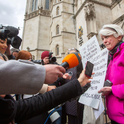It was shocking, but not surprising, to see a range of anti-protest measures announced in the Queen’s Speech almost identical to those that had been roundly rejected when they first appeared in the Police, Crime, Sentencing and Courts Bill just a few months before.
That legislation, which was forced through and is now the Policing Act, contains a range of dangerous measures that have drawn widespread opposition from across society. The act will clamp down on protests deemed too “noisy” and increase the power of the police to surveil and penalise marginalised communities—but it was stripped of some of its more extreme measures by the House of Lords, with the government suffering a series of defeats on protest-banning orders, the offence of “locking on” to railings and buildings, and stopping and searching protesters without suspicion. All these provisions were removed.
Now, however, the same elements are set to be forced through in a new Public Order Bill—which doesn’t just rehash the rejected parts of the Policing Act but goes even further. The bill will create a new criminal offence of interfering with key national infrastructure such as airports, railways and printing presses, and make it illegal to obstruct major transport works.
It also takes measures like Serious Disruption Prevention Orders (SPDOs) and not only re-instates them, but makes them even more draconian. SDPOs are a new civil order that can be imposed on anyone who has participated in at least two protests in the last five years—regardless of whether they have a protest-related conviction. They were bad enough the first time, but now, those given an SDPO would be subject to an electronic monitoring condition, like GPS tags. SDPOs are just the latest in a long line of civil-criminal orders like Football Banning Orders, Serious Violence Reduction Orders, and Asbos, which drag people into a cycle of criminalisation, punishment, surveillance and incarceration.
There is obviously a chilling attempt underway to further restrict people’s ability to protest on issues they care about—it will see many people put off protesting for fear of repercussions, while lots of those who do take part will be criminalised.
It’s not only the effects of these measures that are deeply worrying, but also the way they are being pushed through. By introducing them now, barely weeks after they were soundly rejected by parliamentarians—not to mention decried by the public—this government is showing a clear disregard for parliament and for democracy.
Sadly, this comes as no surprise. What we have seen from this administration in recent years is a concerted effort to sideline parliament, the courts and the people—and make itself untouchable. The Elections Act, recently passed, makes ID mandatory for voting, locking many people out of having their say at the ballot box. The Judicial Review Act makes it harder to challenge the government and public bodies in court. And throughout the pandemic, the government has used secondary legislation which makes it harder for parliamentarians to scrutinise its decisionmaking.
But nowhere is this bid to erode accountability clearer than in the government’s plan to scrap the Human Rights Act, also announced in the Queen’s Speech. This is a power-grab designed to make it impossible for anyone to stand up to those in office.
The Human Rights Act is a vital safeguard. It requires public bodies—whether that’s police, prisons, hospitals or schools—to respect our rights, and allows ordinary people to get justice when their rights have been denied or abused.
The families of the 97 people who died in the Hillsborough disaster, for example, used the Human Rights Act to prove that their loved ones had been unlawfully killed. The victims of the black cab rapist John Worboys used the act to hold the police to account for failing to bring him to justice and put a stop to his rampage of what is believed to be more than 100 rapes and sexual assaults.
But now the government plans to water down these same protections. It also wants to make rights conditional on good behaviour—which flies in the face of the principle of universality, and will create a two-tier system that allows abuses to be inflicted on some groups with impunity. And it plans to make it harder to bring a human rights claim to court in the first place, introducing a “permission stage” which would prevent many vital claims from seeing the light of day.
The implications of these changes are horrifying, but they are no accident. We know that this is a government that is determined to shield itself from scrutiny.
Now it’s up to all of us to stop this assault on our rights. The fierce resistance to the Policing Act resulted in some of the worst aspects of the bill being stripped out, and although the government is trying to bring these elements back, we will fight them again. The enormous grassroots movement that led the last challenge will come together once more—and make it clear to those in power that we won’t let them get away with it.












